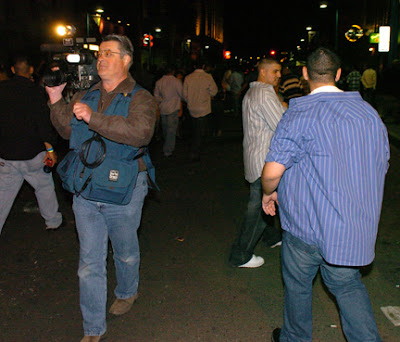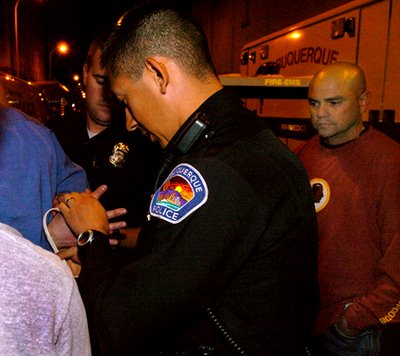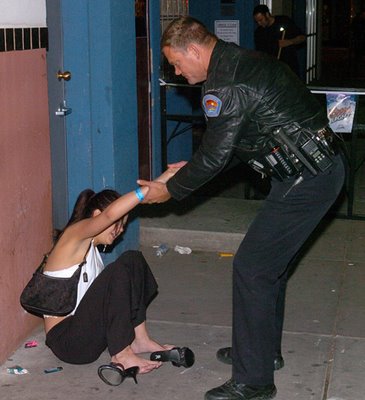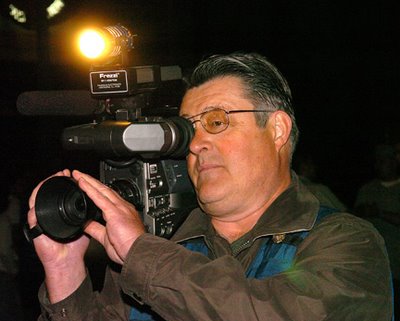 This is a picture of my old partner Robert Fox, a civilian employee of the Albuquerque Police Department. He is assigned to the Video Production Unit at the Police Academy. His job, like mine before I retired, is to produce training videos and the in-house news program, "Duke City Blues." Here he is at the Spring Crawl downtown, several weeks ago, getting footage of officers clearing Central Ave. of revelers after the bars closed.
This is a picture of my old partner Robert Fox, a civilian employee of the Albuquerque Police Department. He is assigned to the Video Production Unit at the Police Academy. His job, like mine before I retired, is to produce training videos and the in-house news program, "Duke City Blues." Here he is at the Spring Crawl downtown, several weeks ago, getting footage of officers clearing Central Ave. of revelers after the bars closed.I show Fox because I’m not sure I can show what I really want you to see without causing an incident; agents from the Department of Public Safety’s Special Investigations Division at work.
Recently, SID agents have been engaging in some investigative activity that is questionable in their efforts to stop bar tenders from over-serving intoxicated patrons and under-aged drinkers. They are requesting people in bars to take breath alcohol tests on portable machines in order to gather necessary evidence to prosecute bar tenders and bar owners.
The owner of the Downtown Distillery, Jacob Traub and two of his employees, one hired to video tape agents and a bar manager, were arrested and charged with "obstruction of an officer in the enforcement/administration of the Liquor Control Act." The three were each videotaping agents who were asking patrons for identification near the establishment. The cameras were also confiscated.
According to an article in the Albuquerque Journal the State’s Department of Public Safety Spokesman Peter Olson, acknowledged that it is not a crime to be intoxicated.
There is no legal presumptive limit for determining an intoxicated person. The .08 breath alcohol content limit applies to driving while under the influence of intoxicating liquor or drugs while operating a vehicle.
Asking an individual who is not suspected of having committed a crime to provide evidence is very questionable. The idea of freedom in this country, absence probable cause, is that your government, in the form of an officer, is prohibited from accosting citizens.
It is a crime for a person underage to either consume alcohol or to frequent a liquor establishment. It is appropriate for agents in gathering evidence to have minors under arrest for being in a bar provide a breath test.
According to the Journal article, court records showed “the agents didn't want to be taped, ‘due to safety concerns involving undercover work.’"
Agents who identify themselves to patrons in order to ask them to take a breath test are not undercover agents. Even if they were undercover agents, revealing their identity is not a crime.
 The New Mexico state statutes states:
The New Mexico state statutes states:60-7A-24. Obstruction of the administration of the Liquor Control Act; criminal penalty; sentencing.
A. Any person who forcibly or by bribe, threat or other corrupt practice obstructs, impedes or attempts to obstruct the administration of the provisions of the Liquor Control Act [60-3A-1 NMSA 1978] is guilty of a fourth degree felony and shall be sentenced pursuant to the provisions of Section 31-18-15 NMSA 1978.
B. Any licensee who forcibly or by bribe, threat or other corrupt practice obstructs, impedes or attempts to obstruct the administration of the provisions of the Liquor Control Act is guilty of violating the Liquor Control Act and shall be punished by fine, suspension or revocation under the procedures of the Liquor Control Act.

It is not a crime to photograph or videotape government officials, agents or officers in public places as long as one is not so close as to physically impede the officer.

Earlier in the evening I was challenged by the APD plain-clothed officer on the right, in the redskins shirt, for taking pictures of this arrest. He approached, telling me to, “Leave, we’re working here.” I told him I was working too. He did not recognize me but backed off anyway. Maybe in part, because APD has an official "On-looker’s Policy.”
The policy allows citizens to observe police working and even to be close enough to overhear a conversation between the officer and citizen. It specifically allows for photographing, audio recording or videotaping contacts, unless the citizen does not want to be overheard. Then the citizen documenting the event must back away out of earshot but may continue to observe and photograph.
 This is Albuquerque Police Officer Brad Arhensfield assisting an apparently intoxicated woman up from the sidewalk at the end of the evening. She went on her way.
This is Albuquerque Police Officer Brad Arhensfield assisting an apparently intoxicated woman up from the sidewalk at the end of the evening. She went on her way. So what's wrong with the picture?
So what's wrong with the picture?The reason I show Fox is he is not videotaping this night for law enforcement purposes but to document police activities for a news segment.
If it’s OK for the government to videotape citizens on the streets, then it has to be OK for citizens to document their government’s activities. Government has no problem videotaping cars passing red lights or using photo-radar pictures as enforcement tools, so why should they have a problem with citizens assuring that agents and officers act properly?
I’m not afraid of trying to photograph the agents but until they learn the law, I've got better things to do than fight a fourth-degree felony for interfering. I’m just pretty sure the DPS SID agents are out of control when it comes to this particular activity.
If I, in particular don’t want to play, because I am unwilling to risk facing the felony charge, then they have successfully intimidated the populace. Now, if I could be relatively certain that these agents would be charging me with a misdemeanor, then I would consider photographing or videotaping them.
No comments:
Post a Comment